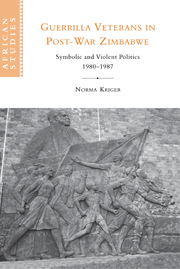Book contents
- Frontmatter
- Contents
- List of tables
- Acknowledgments
- Chronology (1889–1980)
- List of abbreviations
- Map
- 1 Introduction
- 2 The peace settlement
- 3 The assembly phase
- 4 Military integration
- 5 Employment programs for the demobilized
- 6 Conclusion
- Epilogue: the past in the present
- Appendix: The ruling party's attempts to withdraw ex-combatants' special status and ex-combatants' responses, 1988–1997
- Notes
- References
- List of pseudonyms used in the text
- Index
- Cambridge Cultural Social Studies
- Frontmatter
- Contents
- List of tables
- Acknowledgments
- Chronology (1889–1980)
- List of abbreviations
- Map
- 1 Introduction
- 2 The peace settlement
- 3 The assembly phase
- 4 Military integration
- 5 Employment programs for the demobilized
- 6 Conclusion
- Epilogue: the past in the present
- Appendix: The ruling party's attempts to withdraw ex-combatants' special status and ex-combatants' responses, 1988–1997
- Notes
- References
- List of pseudonyms used in the text
- Index
- Cambridge Cultural Social Studies
Summary
Despite guerrilla wars being the major form of contemporary warfare, we know remarkably little about the politics of guerrilla incorporation and its consequences for political and economic development. Though social science offers competing models for understanding the relationship between states and different social groups, it has had a tradition of paying relatively less attention to military groups, despite their importance. Social science has also often assumed that revolutionary wars end in military victory. In contrast, the post-Cold War literature on peace settlements and demobilization and reintegration programs (DRPs), collectively referred to as peace-building studies, places military formations on the international policy agenda and assumes the significance of peace settlements in shaping outcomes. This study builds on the latter literature insofar as it seeks to understand the politics of Zimbabwe's first seven years by examining the Lancaster House peace settlement and guerrilla programs: assembly, disarmament, demobilization, military integration, and civilian employment. The book asks different questions, though, from the war-to-peace transitions literature and from DRP studies.
Rather than asking about the conditions, determinants, or lessons of success and failure for peace-building, the central motivating question of this study concerns the strategies, agendas, resources, and interactions of the ruling party and the ex-combatants. Insofar as outcomes are a core concern, this book is engaged in an evaluative exercise. But its purpose is to understand to what extent actors achieved their own agendas rather than peace-building objectives which the international agencies (with scholars close behind) have embraced.
- Type
- Chapter
- Information
- Guerrilla Veterans in Post-war ZimbabweSymbolic and Violent Politics, 1980–1987, pp. 185 - 190Publisher: Cambridge University PressPrint publication year: 2003



